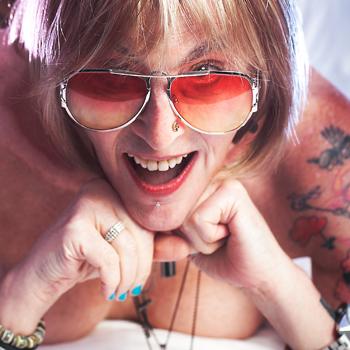A couple of months ago, with the ink barely dry on the contracts, I get a call from Kate Bornstein to ask me what’s happening, queer-wise, in Toronto? She’s Googled and had a look at Xtra, and she wants to know what is really on trans people’s minds up in the big smoke. Entrusted with the responsibility of being one of the speakers at the first ever Trans Pride rally (with politics and power, rather than the finalists from Queer Idol), she wants to make sure she’s relevant and connected.
Relevant and connected are two of Bornstein’s watchwords as an artist and cultural worker, and they have been for two decades. Perhaps it explains why Bornstein, at 63, is still packing rooms full of cheering (and frequently swooning) audience members, delighted by her sexy, salty take on suicide, bullying, art, gender, sex and fucking. And while she loves her university and community centre gigs, Bornstein explains that she is particularly looking forward to addressing a Trans Pride March.
“Trans people can take pride in so much. We survived another year! That’s worth being proud about. And those of us who are out can be proud that we have the strength to do that, and we make it easier for others to live their trans lives,” Bornstein says.
She’s not wrong.
The recent news about the transphobic shooting of Halifax resident Chris Cochrane proves that point all-too-pointedly — trans people, especially trans women or trans feminine people, and extra-especially trans women of colour — are disproportionately at risk of violence. And while some people might be ready to cast off their gay identifiers and embrace a “post-mo” lifestyle of wall-to-wall parties and ironic hairstyles, it’s simply not an option for a lot of trans folks, who are still fighting for some pretty basic rights.
Still, Bornstein says, before we get down to business, she’s delighted by the idea of a march.
“Trans Pride? It’s dreamy,” she muses. “Could we get David Tennant from Dr Who to meet us at the end? That would be my fantasy, not just a dream.”
I promise her we’ll do our best.
Still determined to bust binaries — or at least binary thinking — and move people toward healing, Kate Bornstein spends a lot of time thinking and talking about categories and expectations, especially what categories or expectations are holding people back from their best selves. Her most recent book, Hello Cruel World: 101 Alternatives to Suicide for Teens, Freaks and Other Outlaws, identifies a 29-point scale of feelings, from nicest to worst. On the Bornstein scale, Joy takes the top spot. And the bottom one? The very worst feeling you could possibly feel? Trapped. No wonder, then, that Bornstein — deeply invested in the tradition of the trickster and the fool — pins her hopes of helping a situation on bringing movement to those who are stuck in place.
But, as she has written frequently, binaries reinforce and replicate themselves. One of the brightest threads through Bornstein’s work has always been the startling recognition that binary thinking (“There are two kinds of people: the kind who are like this and the kind who are opposite to that”) makes for binary behaviour (“Well, I guess I’m the ‘opposite’ sort”).
Here’s how this works: we act like we think we should, because it gets reinforced by the media and other cultural forces. We betray no sign that we might act otherwise if we thought it would be appropriate, because we’re afraid it isn’t. We participate in this performance because it makes moving through the world, staying employed, finding dates and so on much easier. But by participating in it, we remove any sign that we secretly harbour some dissent. And so the next person, trying to figure out how to behave, is left seeing only binary behaviour, and the whole cycle rolls ‘round again.
What Kate Bornstein seems to understand better than a lot of people is that you cannot push or pull people away from their comfortable places in society. What you can do, however — what Bornstein is both the master and the mistress of — is entice them. Even people who resist being pulled will yield to delicious temptation. And when gender theory gets fun and sexy, when enlightenment comes with an exceptionally cute and friendly form like Bornstein, well, it turns out that a lot more people are ready to play. She encourages us to experiment with ways to turn gender, power and privilege inside out and upside down, to wear them with a twist or discard them and sew our own ever-so-fabulous accessories.
When I ask her whether she has any thoughts for trans things trying to have the best possible lives, her answers are predictably fun and fluid. Kate Bornstein’s top three tips?
1. Find a role model in TV, fiction or movies, someone you want to be or someone you want to fuck or best of all, both, and bit by bit become her/him/them.
1a. Give yourself plenty of strokes for doing it. It’s hard work, you know.
2. Hang out with people who love you, or at the very least like you a lot, in person or online. Stay away as much as you can from those other kind.
3. Remember that most trans peeps are on a continuing journey. That means that every day we do something for the first time in a new identity. Notice those times. Be proud of yourself for every new first time.
Bornstein reports that she looks forward to having a great time encouraging Toronto’s queer and trans things to do just that over the Pride weekend and says, “Feel free to practise ahead of time! Toronto always does fabulous things for me.”
You do fabulous things for us, too, Kate.
Friday, July 1, 7pm
George Hislop Park
Wed, June 29, 7:30pn
No cover
Gladstone Hotel, 1214 Queen St W


 Why you can trust Xtra
Why you can trust Xtra


